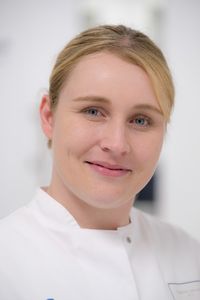Get to know Prof. Nina Neuhaus, one of the invited speakers to the upcoming 16th NYRA Meeting in Brussels (May 27th-29th), through this interview. Prof. Neuhaus is the group leader of the Germline Stem Cells Group at CeRA, Münster. Her research focuses on male infertility and fertility preservation of immature testicular tissue.
When and why did you decide to work in the field of reproductive biology?
As topic for my diploma thesis I was given the following two options by my Prof. in Evolutionary Biology: A) To assess the genetic diversity of earthworms on a golf course. B) To uncover the genetic cause leading to a female phenotype of two individuals with a 46,XY karyotype. I chose B) and found my passion for translational research in the area of reproductive biology. Fortunately, the data from my diploma thesis resulted in a publication (Kossack et al. PLoS Med. 2008), which was the basis for my stipend from the Daimler and Benz Foundation. This stipend allowed me to work in the wonderful Prof. Renee Reijo Pera’s lab, which focused on the genetic causes of human infertility at University of California, San Francisco (UCSF) and Stanford University.
Could you name a moment of challenge (and which lesson did you learn from it)?
Each rejection of a manuscript or grant application is a challenge. My routine is to allow myself a day of frustration with generally bad food choices. The day after, I go back to the rejection letter, identify the constructive comments and use them to improve my work. Actually, as scientist, it is an important and valuable quality to deal gracefully with criticism and rejection of your work.
What was the greatest success in your career?
The approval of my research project within the Clinical Research Unit CRU326 ‘Male Germ Cells’ in 2017 enabled me to work in an amazing, highly talented, and creative research team as well as to collaborate with wonderful research groups also outside the Centre of Reproductive Medicine and Andrology (CeRA). Last but not least, it allowed me to pursue my career in academia. Therefore, the approval of this interdisciplinary research unit was a success and game changer for my academic career.
Which advice would you give young researchers?
I love working in interdisciplinary and international teams and I am passionate about research. Decisions in my career were therefore often based on a combination of heart and mind. As I am convinced that passion is the basis for success, my suggestion would be to ‘follow your hearts and find a job that you are passionate about’.

